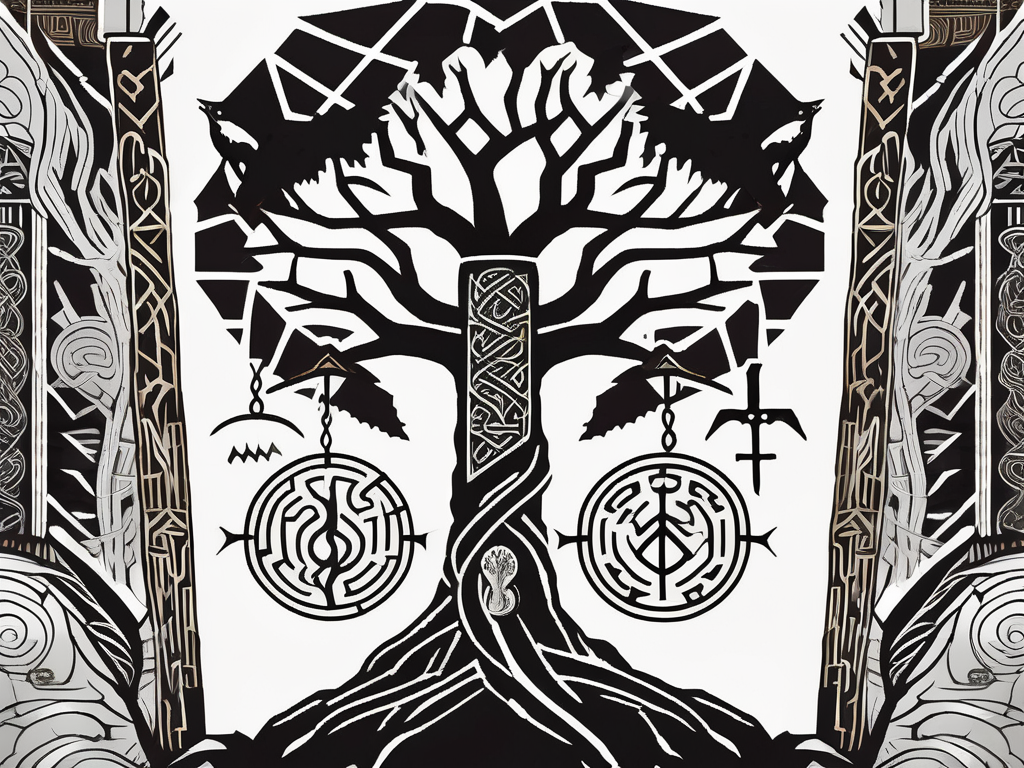Egyptian mythology is a fascinating realm filled with gods and goddesses, each with their own unique stories and powers. For centuries, the mysteries surrounding the Egyptian gods have captivated the imagination of scholars and enthusiasts alike. In this article, we will delve into the secrets of the Egyptian gods, shedding light on their symbolism, cults, and the legacy they have left behind.
Understanding the Pantheon of Egyptian Gods
Ancient Egyptian society revolved around a pantheon of gods, where each deity had a distinct role and significance. The gods were believed to govern every aspect of life, from the natural world to the intricate workings of human existence.
The ancient Egyptians had a deep and profound reverence for their gods. They believed that these divine beings were not only powerful, but also intimately involved in the affairs of mortals. The gods were seen as protectors, guiding forces, and intermediaries between the mortal realm and the divine. Egyptians believed that by appeasing the gods, they could ensure prosperity, fertility, and protection.
Every aspect of Egyptian society was influenced by the gods. From the construction of monumental temples to the rituals performed in daily life, the presence of the gods was ever-present. The Egyptians believed that their gods had the power to bring about both blessings and curses, and therefore, it was of utmost importance to maintain a harmonious relationship with them.
The Role of Gods in Ancient Egyptian Society
The gods played a crucial role in the daily lives of the ancient Egyptians. They were not distant and aloof entities, but rather, they were seen as active participants in the lives of mortals. Egyptians believed that the gods had the ability to influence the natural world, control the forces of nature, and even intervene in human affairs.
For example, the god Thoth was associated with writing, wisdom, and knowledge. He was believed to have invented writing and was seen as the patron deity of scribes. The ancient Egyptians believed that by invoking Thoth’s blessings, they could gain favor in their scholarly pursuits and ensure success in their endeavors.
Similarly, the goddess Hathor was associated with love, beauty, and joy. She was revered as the patroness of music, dance, and fertility. Egyptians believed that by honoring Hathor, they could ensure a harmonious and joyful existence, filled with love and abundance.
The Most Prominent Egyptian Gods
Among the many gods, several stood out as the most prominent figures in Egyptian mythology. These gods held immense power and were worshipped by the ancient Egyptians with great fervor and devotion.
Osiris, the god of the afterlife, was one of the most revered gods in ancient Egypt. He was believed to be the ruler of the underworld and the judge of the deceased. Egyptians believed that upon death, their souls would be judged by Osiris, and if found worthy, they would be granted eternal life in the afterlife.
Isis, the wife and sister of Osiris, was a goddess associated with magic and motherhood. She was revered as a powerful and compassionate deity, known for her ability to heal and protect. Isis was also seen as a symbol of femininity and fertility, and she was often invoked by women seeking assistance in matters of childbirth and family.
Ra, the sun god, held a central position in Egyptian mythology. He was believed to be the creator and the king of all the gods. Ra was associated with the sun, which was seen as the source of life and light. Egyptians worshipped Ra as the giver of life and believed that his presence brought warmth, vitality, and abundance to the world.
These are just a few examples of the many gods that were worshipped in ancient Egypt. Each god had their own unique attributes, symbols, and rituals associated with them, making the Egyptian pantheon a rich and complex tapestry of divine beings.
The Symbolism Behind Egyptian Gods
The ancient Egyptians employed various symbols and representations to depict their gods, each carrying significant meanings. These symbols and representations were not only visually appealing but also held deep cultural and religious significance.
Ancient Egyptian mythology was rich with animal symbolism, with animals playing a crucial role in the depiction of gods. These animals were chosen carefully, as each had its own unique characteristics and associations. For example, the jackal-headed god Anubis was associated with death and embalming due to the animal’s connection with cemeteries and tombs. The jackal, being a scavenger, was believed to have a close connection to the afterlife, making it a fitting representation for Anubis.
Similarly, the falcon-headed god Horus symbolized kingship and divine protection. The falcon, with its keen eyesight and ability to soar high in the sky, was seen as a powerful and majestic creature. This made it an ideal representation for Horus, who was considered the protector of the pharaoh and the embodiment of royal authority.
Color was another important element in Egyptian god imagery. The choice of colors conveyed specific meanings and added depth to the depictions of the gods. Gold, for instance, symbolized divinity and eternity. The Egyptians believed that gold was the flesh of the gods and that it represented their eternal nature. This is why many gods, such as Ra and Osiris, were often depicted with golden skin or wearing golden crowns.
On the other hand, green represented rebirth and regeneration. The color green was associated with the fertile lands along the Nile River, which brought life and sustenance to the Egyptian people. Gods like Osiris, who was the god of the afterlife and the ruler of the underworld, were often depicted with green skin or wearing green clothing to symbolize their connection to the cycle of life, death, and rebirth.
In addition to animals and colors, various other symbols were used to represent Egyptian gods. These symbols ranged from hieroglyphs and sacred objects to specific body postures and gestures. Each symbol had its own unique meaning and added to the overall complexity and depth of the god’s representation.
Overall, the symbolism behind Egyptian gods was a reflection of the ancient Egyptians’ beliefs, values, and understanding of the world around them. Through the careful selection of animals, colors, and other symbols, the Egyptians were able to visually convey the divine qualities and attributes of their gods, creating a rich and intricate mythology that continues to fascinate and inspire to this day.
The Cults and Temples of Egyptian Gods
Worship of the gods in Ancient Egypt was carried out through cults and in magnificent temples dedicated to their worship.
The ancient Egyptians believed in a pantheon of gods and goddesses, each with their own unique powers and responsibilities. These deities were seen as the protectors and guardians of the people, and it was believed that by offering prayers and sacrifices, the gods would bestow their blessings upon the worshippers.
The Purpose and Function of Temples
Temples played a central role in Egyptian society. These grand structures were not just places of worship but also centers of economic and political power. The construction of temples was considered a sacred duty, and the pharaohs and nobles would often commission the building of these magnificent edifices to demonstrate their devotion to the gods.
Inside the temples, elaborate rituals and ceremonies were conducted by the priests. These rituals were believed to establish a direct connection between the mortal realm and the divine. The priests would perform sacred rites, offer prayers, and make offerings to the gods on behalf of the people.
Furthermore, temples served as the focal points for religious rituals, where offerings were made to the gods by priests and worshippers alike. These offerings included food, drink, and various material goods, all of which were believed to be essential for the well-being of the gods and the prosperity of the people.
The Influence of Cults on Egyptian Society
The cults dedicated to specific gods had a profound impact on Egyptian society. Each cult had its own priesthood, rituals, and festivals, which shaped the beliefs and practices of the people. These cults fostered a strong sense of community and cohesion among the worshippers, reinforcing the importance of the gods in everyday life.
For example, the cult of Osiris, the god of the afterlife, emphasized the belief in resurrection and eternal life. This cult played a crucial role in the funerary rituals and practices of the ancient Egyptians, providing comfort and hope for the deceased and their families.
Similarly, the cult of Ra, the sun god, was associated with the power and vitality of the sun. The worship of Ra was not only a religious practice but also had practical implications for agriculture and daily life, as the sun was seen as the source of life and fertility.
Moreover, the cult of Isis, the goddess of magic and motherhood, was particularly popular among women. Isis was believed to possess great healing powers and was often invoked for protection during childbirth. The cult of Isis provided a sense of empowerment and support for women in ancient Egyptian society.
In conclusion, the cults and temples of Egyptian gods were not just places of worship, but also integral to the social, economic, and political fabric of ancient Egyptian society. These institutions played a vital role in shaping the beliefs, practices, and sense of community among the worshippers, reaffirming the significance of the gods in every aspect of life.
The Mysteries Surrounding Egyptian Gods
Despite our knowledge of the Egyptian gods, there are still many enigmatic aspects that continue to puzzle scholars and spark debates.
Unresolved Questions and Theories
One of these mysteries revolves around the true nature of the gods. Were they seen as literal deities or symbolic representations of natural phenomena? Scholars have grappled with this question, and various theories have been put forth, each shedding a different light on the religious beliefs of the ancient Egyptians.
The Role of Mythology in Unveiling Secrets
Mythology is intertwined with the secrets of the Egyptian gods. Through the stories and legends passed down through generations, we glimpse into the beliefs and values of this ancient civilization. Exploring the myths surrounding the gods allows us to unravel the mysteries that still surround them.
The Legacy of Egyptian Gods
The influence of the Egyptian gods extends far beyond the boundaries of ancient Egypt.
The Impact on Modern Culture and Religion
Even today, the legacy of the Egyptian gods can be seen in various aspects of modern culture and religion. Films, books, and video games often draw inspiration from the rich tapestry of Egyptian mythology, keeping the gods and their stories alive in the collective imagination.
The Egyptian Gods in Art and Literature
Art and literature have been profoundly influenced by the Egyptian gods. Sculptures, paintings, and hieroglyphs beautifully depict the gods, showcasing their power and significance. Ancient Egyptian texts, such as the Book of the Dead, provide valuable insights into the beliefs and rituals associated with the gods.
As we delve into the secrets of the Egyptian gods, we uncover a fascinating world of symbolism, legends, and rituals. These enigmatic deities continue to capture our imagination, reminding us of the intricate tapestry of ancient Egyptian culture and mythology.












